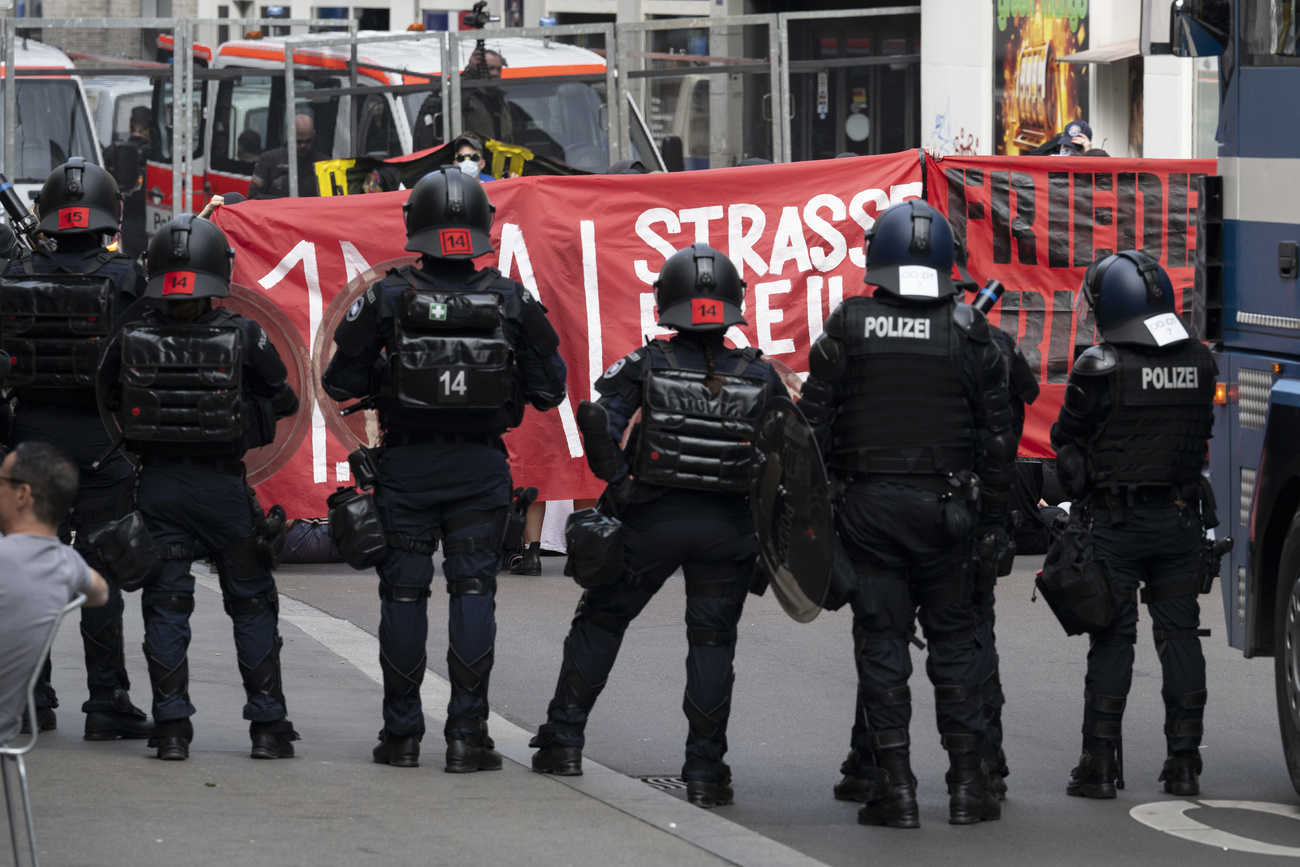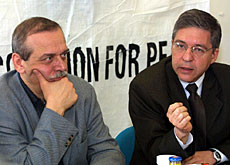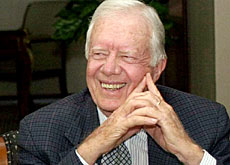Jimmy Carter: Camp David to the Geneva Accord

The former American president, Jimmy Carter, has offered his backing to the Geneva Accord, an unofficial peace treaty for the Palestinians and the Israelis.
Carter told swissinfo that the accord could help boost the United States-backed road map, but added that the US must rein in its perceived pro-Israeli bias.
The unofficial peace plan is backed by a number of Israeli and Palestinian personalities, and the Swiss government has offered financial and logistical support to the initiative.
But the accord, which will be launched in Geneva on December 1, has attracted severe criticism from Israel’s government and Jewish groups, as well as Palestinian factions.
Carter, who was US president from 1977 to 1981, was awarded the Nobel peace prize in 2002 for his work in mediating conflicts.
swissinfo: President Carter, why did you decide to accept Switzerland’s invitation to attend the signing of the Geneva Accord?
Jimmy Carter: The Carter Center has been informed for several years about the good work being done by the parties involved in this accord, and for the last few months, I’ve had a representative at the negotiations.
Furthermore, I’ve been very discouraged and disappointed by the lack of progress in the so-called road map process. Israelis and Palestinians have not made any movement toward peace. In particular, there is continued settlement activity.
What the Geneva Accord does envisage is quite accurately compatible with the ultimate goal of the road map and the Oslo accords of 1993.
swissinfo: Some parties have criticised the role of Switzerland as an instigator and promoter of this document. Do you believe that it is appropriate for a country such as Switzerland to get involved?
J.C.: We are very grateful to the Swiss. I note that Oslo was a major step towards peace, and that it was almost entirely done by the Norwegians without much support from the United States.
swissinfo: President Bill Clinton was also invited but has not yet accepted the Swiss invitation. No one from the Bush administration will attend the signing. In your view, would it be important that Clinton and the Bush administration attend the signing?
J.C.: Yes, I would like very much for them to attend. I am pleased that the Bush administration has not condemned the Geneva Accord. My guess is that there will be growing support for it, both in Israel and elsewhere.
swissinfo: Proponents of the Geneva Accord say that it is largely based on the proposals Clinton made to Ehud Barak and Yasser Arafat at Camp David in 2000. Is that correct?
J.C.: It’s a continuation of Camp David. Now, the proposals that were made at Camp David were unacceptable to the Palestinians.
Yasser Arafat could not have survived politically if he had accepted those proposals. They still maintained a wide array of settlements in Gaza and the West Bank.
Also, there was no tangible solution to the Jerusalem and refugee issues. But it was a base, and the Geneva Accord is a culmination of all previous accords that have been passed.
swissinfo: The authors of the Geneva accord also say that their document is a comprehensive one that deals with all the issues including refugees, settlements, and the status of Jerusalem. What is your assessment of the text of the accord itself?
J.C: Generally speaking, it seems to me that it is a positive step based on concessions on both sides. I note that the dispositions on returnees will have to be approved by the Israeli government.
It’s also a good step forward on the issue of settlements. For the first time, it is provided that settlers could stay in their homes on Palestinian land.
There’s also the removal of outlying Israeli settlements that are illegal in the first place.
swissinfo: Is the Geneva Accord the best agreement that can be achieved right now?
J.C.: It’s the best we can get at this point and it is a very difficult thing to do to make these concessions.
swissinfo: Looking at the situation on the ground, it seems like the road map, sponsored by the United States, Russia, the European Union and the United Nations, is not working. What is needed in order to get out of the current impasse?
J.C.: The Geneva Accord is quite compatible with the ultimate goal of the roadmap. The step-by-step process is what has killed the road map.
The Israeli government has not been willing to take the first steps such as dismantling settlements and that has spurred Palestinian violence. But I believe the Geneva Accord provides a picture of what can be done.
swissinfo: In Switzerland, as in other countries in western Europe, there is a widespread view that, especially since Bush entered the White House, the US favours Israel to the detriment of the Palestinians. Do you share that view?
J.C.: President Bush is the first American president, since the foundation of Israel, who has taken a position strongly biased to the Israeli side.
It has not been easy for his predecessors in the US who have been criticised every time they criticised the US policy in the Middle East or the Israeli government. What is needed is a set of balanced proposals.
Unfortunately, President Bush has almost invariably sided with Prime Minister Sharon, or when Sharon has refused to accept Washington’s proposals, Washington has, in effect, ignored what Israel did subsequently.
There have been a few weak statements from the Bush administration on settlements and the fence, but no real effort to do more.
swissinfo-interview: Marie-Christine Bonzom in Washington
Jimmy Carter was the US president for one term, between 1977 and early 1981.
He was awarded the Nobel peace prize in 2002, for his efforts to find peaceful solutions to international conflicts, to advance democracy and human rights, and to promote economic and social development
He has offered his support for the Geneva Accord, which will be launched on December 1.
It is backed by a number of personalities, including the former Israeli cabinet minister, Yossi Beilin, and his Palestinian counterpart, Yasser Abed Rabbo.

In compliance with the JTI standards
More: SWI swissinfo.ch certified by the Journalism Trust Initiative











You can find an overview of ongoing debates with our journalists here . Please join us!
If you want to start a conversation about a topic raised in this article or want to report factual errors, email us at english@swissinfo.ch.